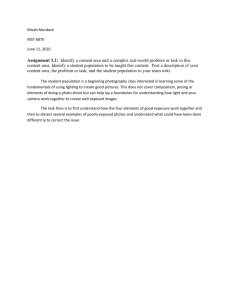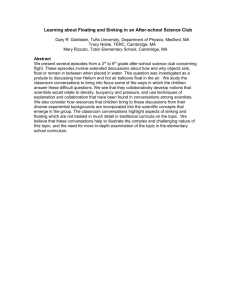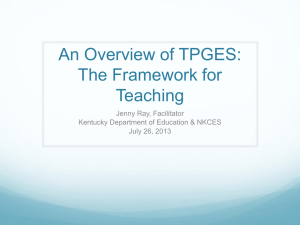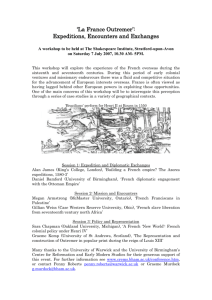US v MURDOCK RECOMMENDED FOR FULL
advertisement
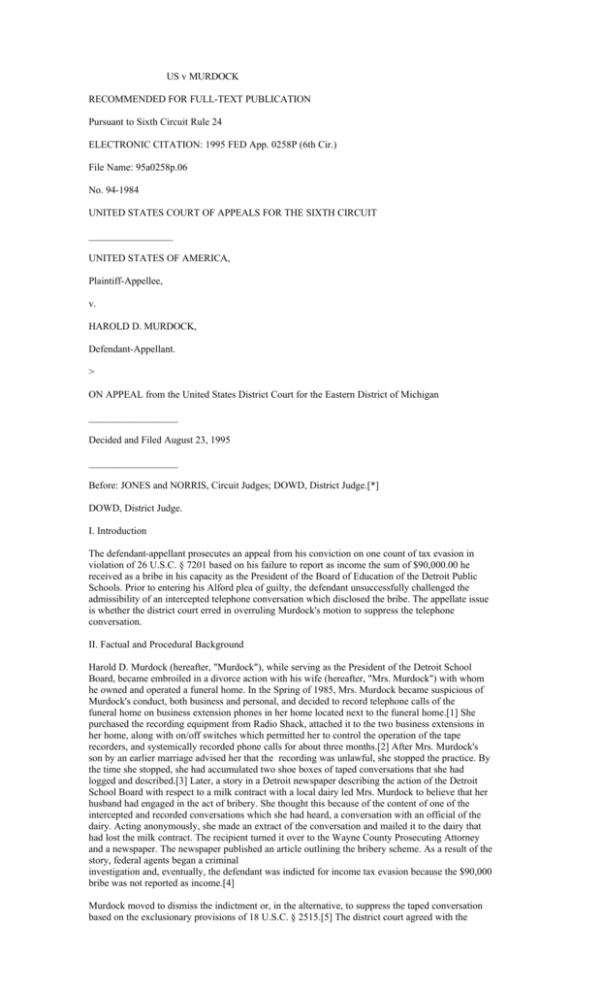
US v MURDOCK RECOMMENDED FOR FULL-TEXT PUBLICATION Pursuant to Sixth Circuit Rule 24 ELECTRONIC CITATION: 1995 FED App. 0258P (6th Cir.) File Name: 95a0258p.06 No. 94-1984 UNITED STATES COURT OF APPEALS FOR THE SIXTH CIRCUIT _________________ UNITED STATES OF AMERICA, Plaintiff-Appellee, v. HAROLD D. MURDOCK, Defendant-Appellant. > ON APPEAL from the United States District Court for the Eastern District of Michigan __________________ Decided and Filed August 23, 1995 __________________ Before: JONES and NORRIS, Circuit Judges; DOWD, District Judge.[*] DOWD, District Judge. I. Introduction The defendant-appellant prosecutes an appeal from his conviction on one count of tax evasion in violation of 26 U.S.C. § 7201 based on his failure to report as income the sum of $90,000.00 he received as a bribe in his capacity as the President of the Board of Education of the Detroit Public Schools. Prior to entering his Alford plea of guilty, the defendant unsuccessfully challenged the admissibility of an intercepted telephone conversation which disclosed the bribe. The appellate issue is whether the district court erred in overruling Murdock's motion to suppress the telephone conversation. II. Factual and Procedural Background Harold D. Murdock (hereafter, "Murdock"), while serving as the President of the Detroit School Board, became embroiled in a divorce action with his wife (hereafter, "Mrs. Murdock") with whom he owned and operated a funeral home. In the Spring of 1985, Mrs. Murdock became suspicious of Murdock's conduct, both business and personal, and decided to record telephone calls of the funeral home on business extension phones in her home located next to the funeral home.[1] She purchased the recording equipment from Radio Shack, attached it to the two business extensions in her home, along with on/off switches which permitted her to control the operation of the tape recorders, and systemically recorded phone calls for about three months.[2] After Mrs. Murdock's son by an earlier marriage advised her that the recording was unlawful, she stopped the practice. By the time she stopped, she had accumulated two shoe boxes of taped conversations that she had logged and described.[3] Later, a story in a Detroit newspaper describing the action of the Detroit School Board with respect to a milk contract with a local dairy led Mrs. Murdock to believe that her husband had engaged in the act of bribery. She thought this because of the content of one of the intercepted and recorded conversations which she had heard, a conversation with an official of the dairy. Acting anonymously, she made an extract of the conversation and mailed it to the dairy that had lost the milk contract. The recipient turned it over to the Wayne County Prosecuting Attorney and a newspaper. The newspaper published an article outlining the bribery scheme. As a result of the story, federal agents began a criminal investigation and, eventually, the defendant was indicted for income tax evasion because the $90,000 bribe was not reported as income.[4] Murdock moved to dismiss the indictment or, in the alternative, to suppress the taped conversation based on the exclusionary provisions of 18 U.S.C. § 2515.[5] The district court agreed with the government's position that, by reason of the provisions of Section 2510(5)(a), the statutory prohibitions involving intercepted conversations did not apply to an extension line of a business phone or to a recording made of a captured conversation. Alternatively, the district court held that the statutory exclusion provisions of Section 2515 did not apply to the government where it played no part in the interception of the conversation. Consequently, the district court denied Murdock's motion to exclude the intercepted conversation. Murdock entered a conditional plea of guilty under a plea agreement wherein he reserved his right to appeal.[6] The district court sentenced Murdock to one year and one day in prison and imposed a $5000 fine. Murdock is free on bond pending this appeal. III. Discussion A. Issue on Appeal and Standard of Review The issue on appeal is whether the district court erred in overruling Murdock's motion to suppress the tape recording. To decide this issue, the court must examine the statutory framework of Title III of the Omnibus Crime Control and Safe Streets Act of 1968, codified at 18 U.S.C. § § 2510-2521. The court reviews the district court's conclusions of law de novo and its factual findings for clear error. United States v. Martin, 25 F.3d 293, 296 (6th Cir. 1994). B. The Extension Telephone Exemption -- 18 U.S.C. § 2510(5)(a) Our analysis begins with the recognition that Section 2511(l)(a) makes it unlawful for "any person" to "intentionally intercept[ ]" any "wire, oral, or electronic communication[.]" Sections 2510(4) and (5), read together, establish an exemption for certain devices, including extension telephones. Known as the "telephone extension exemption" or the "business extension exemption," it "places outside the reach of Title III the monitoring of communications carried out by certain types of equipment and done in the ordinary course of business." Williams v. Poulos, 11 F.3d 271, 279 (1st Cir. 1993). Section 2510(4) defines an interception as "aural or other acquisition of the contents of any wire, electronic, or oral communication through the use of any electronic, mechanical, or other device[.]" Section 2510(5) defines an "electronic, mechanical, or other device" as any device or apparatus which can be used to intercept a wire, oral, or other communication other than -(a) any telephone or telegraph instrument, equipment or facility, or any component thereof, (i) furnished to the subscriber or user by a provider of wire or electronic communication service in the ordinary course of its business and being used by the subscriber or user in the ordinary course of its business[.] . . . Following an extensive evidentiary hearing, the district court concluded that Section 2510(5)(a)(i) was intended to cover tape recorders attached to extension phones. Acknowledging that the Sixth Circuit had not yet ruled on that issue, the district court cited Simpson v. Simpson, 490 F.2d 803 (5th Cir.), cert. denied, 419 U.S. 897 (1974); United States v. Harpel, 493 F.2d 346 (10th Cir. 1974); Anonymous v. Anonymous, 558 F.2d 677 (2d Cir. 1977); Epps v. St. Mary's Hosp. of Athens, Inc., 802 F.2d 412 (11th Cir.), reh'g denied, 807 F.2d 999 (1986); and Newcomb v. Ingle, 944 F.2d 1534 (10th Cir. 1991), cert. denied, 502 U.S. 1044 (1992), in support of his conclusion that the Radio Shack recording equipment, when combined with the extension telephone, came within the exemption. We find better reasoning in three recent decisions: Deal v. Spears, 980 F.2d 1153 (8th Cir. 1992), Williams v. Poulos, supra, and Sanders v. Robert Bosch Corp., 38 F.3d 736 (4th Cir. 1994), reh'g and suggestion for reh'g en banc denied (January 24, 1995) (No. 93-2351, 93-2423). We shall follow them rather than the decisions of the Second, Fifth, Tenth and Eleventh Circuits relied upon by the district court. 1. "Interception" -- 18 U.S.C. § 2510(4) In the Eighth Circuit case of Deal v. Spears, supra, the plaintiff, a former employee of the defendants, prosecuted a civil action seeking compensatory and punitive damages after the plaintiff learned that her employers, who lived in a mobile home adjoining the convenience store where she was employed, had intentionally intercepted and disclosed her telephone conversations. The defendants had suspected the plaintiff of providing inside information which facilitated an earlier burglary of the store. They installed a recording device on the extension phone in the mobile home and recorded 22 hours of Deal's conversations. One of the persons with whom Deal had extensive conversations was the co-plaintiff and the district court noted that much of the conversation was "sexually provocative." The Deal court concluded: Thus there are two essential elements that must be proved before this [the telephone extension exemption] becomes a viable defense: the intercepting equipment must be furnished to the user by the phone company or connected to the phone line, and it must be used in the ordinary course of business. The Spearses argue that the extension in their residence, to which the recorder was connected, meets the equipment requirement, and the listening-in was done in the ordinary course of business. We disagree. First, we are not as easily convinced as is at least one of our sister circuits that an extension telephone is exempt equipment under section 2510(5)(a)(i) when a recording device is attached to the extension to record calls for later listening. See Epps v. Saint Mary's Hosp. of Athens, Inc., 802 F.2d 412, 415 (11th Cir. 1986) (holding that the interception device was not the equipment used to record the conversation but the dispatch console to which the recorder was attached). The calls would not have been heard or otherwise acquired -- that is, intercepted -- at all but for the recording device, as the Spearses did not spend twenty-two hours listening in on the residential extension. When turned on, the recorder was activated automatically by the lifting of the handset of either phone, even though it was connected only to the extension phone. Further, Deal ordinarily would know (by the "click" on the line) when the residential extension was picked up while she was using the store phone; thus her calls likely would not have been intercepted if the recorder had not been in place. It seems far more plausible to us that the recording device, and not the extension phone, is the instrument used to intercept the call. We do not believe the recording device falls within the statutory exemption. The recorder was purchased by Newell Spears at Radio Shack, not provided by the telephone company. Further, it was connected to the extension phone, which was itself the instrument connected to the phone line. There was no evidence that the recorder could have operated independently of the telephone. We hold that the recording device, and not the extension phone, intercepted the calls. But even if the extension phone intercepted the calls, we do not agree that the interception was in the ordinary course of business. Deal v. Spears, 980 F.2d at 1157-58.[7] The First Circuit case of Williams v. Poulos, supra, was one of several bankruptcy and civil actions which arose from the demise of Consolidated Auto Recyclers, Inc. ("CAR"). Without reviewing the entire factual scenario, suffice to say that CAR principals, trying to get a $1,000,000 monthly telephone bill under control, decided to install a telephone surveillance system which would monitor a single, pre-selected telephone at CAR headquarters. Shortly thereafter, control of the financially-strapped CAR was transferred to Allied Capital Corporation ("Allied"), a venture capital firm. In a short time, the relationship between the new CEO, Ralph Dyer, and CAR's principals soured. CAR's principals wanted to regain control of CAR. They began to target their surveillance equipment on Dyer's conversations as well as on conversations between Allied personnel at CAR and Allied headquarters. Eventually, CAR's principals, attempting to gain an advantage in their quest to regain control, disclosed the fact of their telephone taping and some of the damaging information the tapes revealed. Allied filed an action alleging violations of federal and state wiretapping laws. Dyer intervened. Ultimately, plaintiff prevailed in the case, following a six-day bench trial. The district court ruled that the CAR principals violated the wiretap statutes. Cross-appeals were taken on various issues. The First Circuit affirmed the district court. The Williams court described the monitoring system utilized by CAR as "alligator clips attached to a microphone cable at one end" and an "interface connecting [a] microphone cable to a VCR and a video camera on the other." Williams v. Poulos, 11 F.3d at 280 (internal quotes omitted). The court concluded that the monitoring device was not a "telephone or telegraph instrument, equipment or facility, or a[ ] component thereof[.]" Id. (internal quotes and footnote omitted). The court stated that "it [is] self evident that the CAR system, far from being the type of exempt equipment contemplated by the authors of the business extension exception, is precisely the type of intercepting device Congress intended to regulate heavily when it enacted Title III." Id. The Fourth Circuit case of Sanders v. Robert Bosch Corp., supra, involved a plaintiff who was a security officer whose employer, Guardmark, Inc., contracted to provide security services to Robert Bosch Corp. ("Bosch"). Sanders was assigned to work at Bosch, where she answered telephones in the security office. Bosch, allegedly because it had received bomb threats, installed a tape recording device known as a "voice logger" to record all telephone conversations. Sanders filed suit against Bosch alleging that Bosch had violated her rights under Title III by recording, without her knowledge, all of her telephone conversations. The district court held that Bosch unlawfully intercepted Sanders' conversations because Bosch could not enjoy the business extension exemption. On appeal, the Fourth Circuit stated that "recording of a telephone conversation alone constitutes an 'aural . . . acquisition' of that conversation." Sanders v. Robert Bosch Corp., 38 F.3d at 740 (footnote and citations omitted). Thus, the recording of conversations was an interception "unless the recordings were not effected 'through the use of any electronic, mechanical, or other device.'" Id. Although Bosch's argument was that its voice logger was not an "electronic, mechanical, or other device" because it fell within the business-use exception, the court of appeals affirmed the district court's holding to the contrary. Citing both Deal v. Spears and Williams v. Poulos, the Fourth Circuit concluded that Bosch's voice logger did not meet the two prongs of the test for the exception: "First, the voice logger must constitute a 'telephone or telegraph instrument, equipment or facility, or a[ ] component thereof,' either provided by, and installed by, BellSouth in the ordinary course of its business or, equivalently, supplied by Bosch for connection to BellSouth facilities; second, Bosch's use of the voice logger must fall within the ordinary course of its business." Id. We are convinced that Deal, Williams, and Sanders are the best expressions of the law. Therefore, we conclude that the recording mechanism (a tape recorder connected to extension phones in Mrs. Murdock's home) does not qualify for the telephone extension (or business extension) exemption. 2. "Ordinary Course of Business" -- 18 U.S.C. § 2510(5)(a)(i) We discuss this issue, even though we have concluded as a threshold matter, that the Radio Shack equipment did not meet the Section 2510(5)(a)(i) requirements. Assuming that the Second, Fifth, Tenth and Eleventh Circuits are correct in their analysis and that we are in error to follow the First, Fourth and Eighth Circuits on the threshold issue, the second issue is whether Mrs. Murdock was intercepting and recording the telephone calls in the ordinary course of her business as a subscriber or user of the telephone extension. Mrs. Murdock testified that her purpose was to check on her husband's business dealings related to their mutual funeral business and also to check on his possible marital infidelities. A substantial body of law has developed on the subject of ordinary course of business in the employment field where employees have sued their employers. See, e.g., Deal v. Spears, supra; Epps v. St. Mary's Hosp. of Athens, Inc., supra; Watkins v. L.M. Berry & Company, 704 F.2d 577 (11th Cir. 1983); Briggs v. American Air Filter Co., Inc., 630 F.2d 414 (5th Cir. 1980). These cases have narrowly construed the phrase "ordinary course of business." The Briggs court declined to consider whether a general practice of random monitoring of employee phone calls could ever be justified under the provisions of Section 2510(5)(a)(i), but did declare that when an employee's supervisor has particular suspicions about confidential information being disclosed to a business competitor, has warned the employee not to disclose the information, has reason to believe that the employee is continuing to disclose the information and knows that a particular phone call is to an agent of the competition, it is within the ordinary course of business to listen in on an extension phone for at least as long as the call involves the type of information the supervisor fears is being disclosed. The Deal court found that the indiscriminate recording of 22 hours of calls and subsequently listening to them was beyond the "ordinary course of business." The Watkins court held that a personal call may not be intercepted in the ordinary course of business under the exemption in Section 2510(5)(a)(i), except to the extent necessary to guard against unauthorized use of the telephone or to determine whether or not a call is personal. The St. Mary's Hospital court followed the reasoning of Watkins and found that the intercepted call was not personal but did relate to the business of the employer and was thus intercepted in the ordinary course of the hospital's business. We find that the indiscriminate recording of both incoming and outgoing calls by Mrs. Murdock does not constitute conduct within the ordinary course of the funeral home business in which she had an interest as a part owner. This case is unique, however, in that Mrs. Murdock had a dual purpose in recording the phone calls. She was also concerned about her marriage and the alleged conduct of Murdock that threatened the marriage. As previously noted, the Sixth Circuit does not recognize a spousal immunity or exception to Title III. United States v. Jones, supra. The area of domestic disputes, along with the area of employment litigation, has been a fertile field for civil actions alleging a violation of Title III. The issue that emerges is whether the telephone extension exemption is applicable under any set of circumstances in this circuit given the decision in Jones that Title III does apply to interspousal wiretapping within the marital home. The district court opined that the efforts of Mrs. Murdock in taping her husband's conversations fell within the ordinary course of business and cited the Simpson and Anonymous courts as support. The Simpson court had stated that "it is clear that Congress did not intend to prohibit a person from intercepting a family member's telephone conversations by use of an extension telephone in the family home," Simpson v. Simpson, 490 F.2d at 809, and the district court appeared to rely on that citation to find that Mrs. Murdock's indiscriminate taping of conversations fell within the "ordinary course of business." Simpson recognized what is generally referred to as the interspousal exemption with respect to wiretapping in the marital home. The case involved a civil suit by a former wife against her former husband who had used a wiretap and recording device to capture her conversations with another man that were described as mildly compromising. The opinion focused on the inadequacy of the legislative history as to whether interspousal wiretapping was a target of Title III and then pointed to the telephone extension exception contained in Section 2510(5)(a)(i), along with the presence of criminal penalties for a violation of Title III, to support its conclusion that there was no federal cause of action for the redress of the former wife's grievances against her former husband. It is noteworthy that Simpson did not make the declaration that the husband's conduct fell within the Section 2510(5)(a)(i) exception, but rather that the exemption was indicative of Congress's intention to abjure from deciding a very intimate question of familial relations: that of the extent of privacy family members may expect within the home vis-a-vis each other. Two years later in United States v. Jones, supra, this circuit rejected Simpson to the extent it could be read as proclaiming a broadly-based interspousal exemption for wiretapping. Jones had been indicted for intercepting telephone conversations with his estranged wife and using the contents of the intercepted communications in violation of 18 U.S.C. § 2511(1)(a) and (d). The district court, in reliance on Simpson, dismissed the indictment. The government appealed and the dismissal was reversed. Jones, like the former husband in Simpson, had placed a bug on the telephone and intercepted his wife's conversations. The Jones court, like the court in Simpson, referred to the legislative history and then opined: The Simpson Court noted that the majority of the legislative history dealt with electronic surveillance by law enforcement officials and found the discussion of private surveillance to be inconclusive on the desired scope of the Act's prohibitions. 490 F.2d at 807. However, the legislative history leaves no doubt that the Act was intended to reach private electronic surveillance and that Congress was aware that a major area of use for surveillance techniques was the preparation of domestic relations cases. Professor Robert Blakey, publicly credited with being the author of Title III, testified before the Subcommittee on Administrative Practice and Procedure of the Senate Judiciary Committee that: [P]rivate bugging in this country can be divided into two broad categories, commercial espionage and marital litigation. Congressional awareness that the Act's prohibition of private surveillance would be applicable to domestic relations investigations is reflected in the comments of Senator Hruska, one of the co-sponsors of the bill, which were joined by Senators Dirksen, Scott and Thurmond: A broad prohibition is imposed on private use of electronic surveillance, particularly in domestic relations and industrial espionage situations. Our review of the legislative history of this section, testimony at congressional hearings, and debates on the floor of Congress, inescapably lead to the conclusion that 18 U.S.C. § 2511(1)(a) establishes a broad prohibition on all private electronic surveillance and that a principal area of congressional concern was electronic surveillance for the purposes of marital litigation. The Simpson Court was privy to many of the same materials which were reviewed by this Court. See 490 F.2d at 806-809 nn. 8-16. However in Simpson their importance was discounted because the Court distinguished between unaided surveillance by a spouse and surveillance involving a third-party, even if instigated by the spouse. 490 F.2d at 809. This distinction has been seized upon in a subsequent case. See Remington v. Remington, 393 F.Supp. 898, 901 (E.D. Pa. 1975). In our view, it is a classic "distinction without a difference." For purposes of federal wiretap law, it makes no difference whether a wiretap is placed on a telephone by a spouse or by a private detective in the spouse's employ. The end result is the same -- the privacy of the unconsenting parties to the intercepted conversation has been invaded. It is important to recognize that it is not just the privacy of the targeted spouse which is being violated, but that of the other party to the conversation as well. United States v. Jones, 542 F.2d at 668-670 (footnotes omitted). Anonymous v. Anonymous, supra, became the third case to examine whether Title III applied to interspousal wiretaps used in preparation for divorce litigation. Anonymous, like Simpson, involved a civil suit brought by an ex-wife who contended that her ex-husband had taped her telephone conversations with her eight-year-old daughter while the daughter was in the exclusive custody of the ex-husband. The district court dismissed the complaint and the decision was affirmed on appeal. The Anonymous court declared that it would have been lawful for the father to have listened to mother-daughter phone calls on a telephone extension because it would have constituted a use in the ordinary course of business sanctioned by Section 2510(5)(a)(i). The court concluded that the taping of the phone calls constituted "a distinction without a difference." Anonymous v. Anonymous, 558 F.2d at 679 (citing Simpson, 490 F.2d at 809). The Anonymous court observed that the extension telephone exemption was not available in the Jones case and further noted that the defendant in Jones "invaded the privacy of innumerable persons, known and unknown[,]" Id., a fact which, in the Anonymous court's view, removed that case from the province of mere domestic conflicts. The court then concluded that the Jones court had correctly held that the federal wiretap statutes proscribed the defendant's alleged conduct. Heggy v. Heggy, 944 F.2d 1537 (10th Cir. 1991), cert. denied, 503 U.S. 951 (1992), provided the Tenth Circuit with the opportunity to examine whether Title III civil actions were subject to an interspousal wiretapping exemption. The district court rejected the holdings of Simpson and Anonymous and joined the Fourth, Sixth and Eighth Circuits in holding that spousal wiretapping is actionable under Title III. The defendant-appellant husband had installed a recording device on the extension telephone located in a barn adjacent to the marital home at a time when he and the plaintiff-appellee wife were living together and prior to their eventual divorce. The husband used the wiretap to record his wife's conversations for nearly three months and played at least one of the conversations for his secretary. The husband was the Director of the Oklahoma Bureau of Narcotics and Dangerous Drugs. He testified at trial that he had been receiving death threats by telephone and wanted to record them. The opinion recites that the jury rejected the husband's explanation for the taping and awarded substantial compensatory and punitive damages. The opinion focuses on what is described as the appellant's central argument, i.e., that the district court erred in ruling that Title III applies to interspousal wiretapping within the marital home by failing to follow Simpson. The Heggy opinion rejected Simpson and opined: We reject not only the Simpson court's method of statutory analysis but also its interpretation of the legislative history. Instead, we agree with the district court that the legislative history of Title III evinces a congressional awareness of the widespread use of electronic eavesdropping in domestic relations cases and an intent to prohibit such eavesdropping. See Remarks of Sen. Long, Hearings on Invasions of Privacy Before the Subcomm. on Admin. Practice and Procedure of the Sen. Comm. on the Judiciary, 89th Cong. 1st Sess., part 5 at 2261 (1965-66) ("The three large areas of snooping in this [non-governmental] field are (1) industrial (2) divorce cases, and (3) politics. So far, we have heard no real justification for continuance of snooping in these areas."). Professor Robert Blakey, generally credited as the architect of Title III, testified that "private bugging in this country can be divided into two broad categories, commercial espionage and marital litigation." Hearings on the Right to Privacy Act of 1967 Before the Subcomm. on Admin. Practice and Procedure of the Sen. Comm. on the Judiciary, 90th Cong., 1st Sess., part 2 at 413 (1967). Senator Hruska, a co-sponsor of the bill, commenting on the scope of the statute, noted that "[a] broad prohibition is imposed on private use of electronic surveillance, particularly in domestic relations and industrial espionage situations." S.Rep. No. 1097, 90th Cong., 2d Sess., reprinted in 1968 U.S. Code Cong. & Admin. News 2110, 2112, 2274. Moreover, and in light of the split of judicial authority, had it been the intent of Congress to keep interspousal wiretapping beyond the reach of Title III, Congress could have expressly excluded such wiretapping when it overhauled Title III in the Electronic Communications Privacy Act of 1986, Pub.L. No. 99-508, 100 Stat. 1848. Although the Privacy Act amendments touched nearly every section of Title III, Congress did not codify the judicially created exception for interspousal wiretapping found in Simpson. *** . . . It is highly unlikely, as some courts have suggested, see Lizza v. Lizza, 631 F.Supp. 529, 533 (E.D.N.Y. 1986), that applying Title III to interspousal wiretapping will result in increased federal regulation of domestic relations. Rather, the more likely result is a decrease in interspousal wiretapping. See Wiretapping and Modern Marriage, 91 Dick. L.Rev. at 882-83. Heggy v. Heggy, 944 F.2d at 1540-41 (footnotes omitted).[8] Since the Anonymous court ruled, a series of decisions involving Title III and the telephone extension exemption in a family setting involving children have emerged. In Newcomb v. Ingle, supra, the act of a custodial parent in taping a minor child's conversation within the family home was determined to be permitted by a broad reading of Section 2510(5)(a)(i). Scheib v. Grant, 22 F.3d 149 (7th Cir.), cert. denied, ___ U.S. ___, 115 S. Ct. 320 (1994), presents a variation of the civil litigation spawned by the provisions of Title III. A mother, Lynn Scheib, brought an action against the father's attorneys and her child's guardian ad litem seeking damages for violations of both Title III and Illinois eavesdropping statutes. The parents were involved in a custody and visitation dispute as the mother, who had custody, prepared to leave Illinois with the child. Her husband's emergency motion for injunctive relief had prevented the departure of the child. The father had temporary custody by way of visitation rights and used a telephone answering machine attached to an extension phone to record at least two phone conversations between the mother and child. The father's attorneys agreed with the father that the taped conversations showed that harm was being done to the child and the tapes were delivered to the guardian ad litem. After the mother's lawyers learned of the existence and content of the tapes, they successfully prevented the use of the tapes in the state proceedings and the removal of the child was agreed upon by the parties. Keeping her promise not to sue the father, the mother instead sued the father's lawyers and the guardian ad litem. The district court granted summary judgment to the defendants after determining that the phone extension exemption applied to the home as well as the marketplace. The circuit court affirmed, holding that the recording of the child's conversations fell within the ordinary course of business as it declared: We cannot attribute to Congress the intent to subject parents to criminal and civil penalties for recording their minor child's phone conversations out of concern for the child's well being. Scheib v. Grant, 22 F.3d at 154. The plaintiff-mother had argued that the husband had a dual purpose in the recording in that he also desired to obtain negative information about his ex-wife. The circuit inferentially acknowledged that proof of such a purpose would be actionable, but that the plaintiffs had failed to come forward with any proof of such a motive. This court concludes that the absence of an interspousal exemption from the restrictions of Title III as recognized by this circuit, together with the general proposition that spying on one's spouse does not constitute use of an extension phone in the ordinary course of business, defeats the government's reliance on the proposition that the telephone extension exemption of Section 2510(5)(a)(i) applies to Mrs. Murdock's pervasive recording of the intercepted telephone calls involving many persons other than her husband. Consequently, we turn to the question of whether the statutory suppression provisions of Section 2515 apply in this case. C. Application of 18 U.S.C. § 2515 Section 2515 of Title III provides that when "any wire or oral communication has been intercepted, no part of the contents of such communication and no evidence derived therefrom" can be used in any proceeding "if the disclosure of that information would be in violation of [Title III]." Murdock takes the position that, if his ex-wife's tape recordings are found to violate Title III, then Section 2515 requires suppression. He points to the case of United States v. Vest, 639 F. Supp. 899 (D. Mass. 1986), aff'd, 813 F.2d 477 (1st Cir. 1987), in support of this proposition. The Vest court concluded that suppression of an illegally recorded transaction was required in the prosecution of defendant Vest for perjury. Vest was a Boston police detective who allegedly conspired with Detective Francis Tarantino and one Jesse James Waters (who had shot Tarantino) to use Tarantino's efforts, in return for $300,000 from Waters, to assure that Waters would not be sentenced to prison if he pled guilty to the various charges against him stemming from the shooting. Vest was to be the conduit for the payments to Tarantino. Without Vest's knowledge, Waters recorded the transaction and accompanying discussion. When Waters was sentenced to prison, he turned over the tape to investigating authorities. After Vest was granted immunity, he testified before a grand jury that he had not participated in Waters's payment to Tarantino. When confronted with Waters's tape, Vest denied that it was his voice. The grand jury indicted Vest for perjury. The district and circuit courts found that the interception was unlawful in that it was made in violation of Section 2511(1)(a) and (2)(d). In affirming the district court's suppression of the unlawfully intercepted evidence, the Court of Appeals stated: In Gelbard v. United States, 408 U.S. 41, 47-52, 92 S.Ct. 2357, 2360-63, 33 L.Ed.2d 179 (1972), the Supreme Court exhaustively reviewed the legislative history of Title III and concluded that "the protection of privacy was an over-riding congressional concern" when it enacted Title III, id. at 48, 92 S.Ct. at 2361, and that section 2515's "importance as a protection for 'the victim of an unlawful invasion of privacy' could not be more clear." Id. at 50, 92 S.Ct. at 2362. As the Court recognized in Gelbard, id. at 51-52, 92 S.Ct. at 2362-63, . . . an invasion of privacy is not over when an interception occurs, but is compounded by disclosure in court or elsewhere. The impact of this second invasion is not lessened by the circumstance that the disclosing party (here, the government) is merely the innocent recipient of a communication illegally intercepted by the guilty interceptor (here, Waters). United States v. Vest, 813 F.2d at 481. Thus, the First Circuit read Gelbard as standing for the proposition that any and all illegally intercepted evidence must be suppressed in order to protect the victim's privacy. We do not read Gelbard as broadly as did the Vest court. Gelbard involved a witness's challenge to a finding of civil contempt for refusing to testify before the grand jury, invoking as a defense the ground that the interrogation was to be based on information allegedly intercepted by illegal wiretapping and electronic surveillance conducted by federal agents. The witness wanted an opportunity to challenge the legality of the interceptions before he would be required to testify. Instead he was found in contempt. The Supreme Court held that, in civil contempt proceedings, a witness can invoke Section 2515 as a defense since a finding that the interception was illegal would constitute the "just cause" that precludes civil contempt under 28 U.S.C. § 1826(a). In Gelbard, the witness was asserting that the government itself had engaged in illegal wiretapping and electronic surveillance. The Gelbard Court's discussion of the legislative history of Section 2515, read in context of the facts of the case, emphasized not that individuals are just generally entitled to have their privacy protected, but that they are specifically entitled to protection from unscrupulous law enforcement procedures which invade their privacy. The point of Gelbard was that if the government was eventually shown to have illegally intercepted the conversations, then the witness was entitled under Title III to have that evidence suppressed and completely excluded from any line of questioning in any proceeding, including a grand jury proceeding. To cite Gelbard as standing for the proposition that the entire purpose of Title III is to prevent victimization in the form of invasion of privacy goes too far. As a result, we think that Vest was wrongly decided and we decline to follow it. The district court in the instant case acknowledged the Vest holding and it, too, expressly declined to follow it. Instead, the district court relied on United States v. Underhill, 813 F.2d 105 (6th Cir.), cert. denied, 482 U.S. 906 (1987), to justify a "clean hands" exception to Section 2515.[9] In Underhill, this circuit refused to apply Section 2515 to an unlawful interception because the defendants had been a party to the unlawful interception. Underhill and others had been engaged in a book-making operation. To protect the integrity of the bets received, the bookies had recorded telephonically-placed bets. A search of the premises of the bookies had led to the discovery of the tapes which recorded the bets. As the interception was made for the purpose of committing a criminal act, it was deemed unlawfully intercepted. The bookies moved to suppress the tapes by invoking the provisions of Section 2515. The district court agreed and the government appealed. Judge Lively, writing for the unanimous panel, declared: It seems clear that neither the general purpose of Title III to protect the privacy of parties who use wire and oral communications nor the particular purpose of ?(2)(d) to prevent misuse of the communications against a party to such communications would be served by suppressing the tapes in this case. In fact to do so would turn the statute on its head. *** . . . Title III provides protection to the victims of unlawful interceptions, not to the perpetrators. . . . We think it is clear that Congress did not intend for § 2515 to shield the very people who committed the unlawful interceptions from the consequences of their wrongdoing. . . . If the language of § § 2511(2)(d) and 2515 were applied literally to Underhill and Rokitka it would produce an absurd result that we are confident Congress did not intend. United States v. Underhill, 813 F.2d at 111-112 (citations omitted). The district court in the instant case found that "suppression of the evidence in this case would similarly place Congress's intent on its head[.]" (J.A. at A-71). While Underhill stands for the proposition that the suppression provisions of Section 2515 are not absolute, the instant case differs in a major respect from Underhill and most of the other case law which has built up around Section 2515, namely, in that the defendant was not the perpetrator but rather the victim of the interception and recording. The government, nonetheless, contends that the district court was correct in his recognition of a "clean hands" exception to Section 2515 since such recognition would not create the problem of government agents encouraging violations of Title III. We agree with the district court in his analysis. The government also relies, correctly in our view, on the case of United States v. Baranek, 903 F.2d 1068 (6th Cir. 1990). In Baranek, police officers executing an authorized wiretap of a telephone overheard and recorded an extended non-telephonic conversation over the tapped line when the telephone receiver was inadvertently left off the hook. The court found it unnecessary to suppress the recorded conversation under Section 2515, explaining as follows: There is no doubt the government got a lucky break of sorts here and stumbled across the evidence involving [the defendant]. There is nothing in the fourth amendment or Title III, however, that demands that law enforcement and the public should lose the right to use this evidence. Although we concede that where Title III provides greater protection than the fourth amendment a defendant is entitled to the enhanced protection, we do not accept defendant's contention that fourth amendment law is not involved in the resolution of Title III suppression issues. The Supreme Court has indicated to the contrary: Any lingering doubt is dispelled by the legislative history which, as we have recognized before in another context, declares that § 2515 was not intended "generally to press the scope of the suppression role beyond present search and seizure law." S.Rep. No. 1097, 90th Cong., 2d Sess., 96 (1968). See Alderman v. United States, 394 U.S. 165, 175-176 [89 S.Ct. 961, 967-68, 22 L.Ed.2d 176] (1969). Scott v. United States, 436 U.S. 128, 139, 98 S.Ct. 1717, 1724, 56 L.Ed.2d 168, reh'g denied, 438 U.S. 908, 98 S.Ct. 3127, 57 L.Ed.2d 1150 (1978) (footnote omitted). Where, as here, we have a case with a factual situation clearly not contemplated by the statute, we find it helpful on the suppression issue (as opposed to the question of whether there was a violation of the authorization order) to look to fourth amendment law. We note in that regard that government agents are charged with no wrongdoing and that to suppress here would have no impact on the future conduct of law enforcement officials. In the usual fourth amendment calculus, these are factors that counsel against the necessity of suppression. United States v. Baranek, 903 F.2d at 1072 (emphasis in original). As in Baranek, the government here got "a lucky break." It was in no way involved in Mrs. Murdock's tape recording activities and the defendant makes no claim that Mrs. Murdock was an agent of the government. Suppression of the evidence would have no deterrent effect. As the district court properly noted: "The intent of Congress would certainly have been followed had section 2515 served to deter Mrs. Murdock, but no deterrent effect is worked on the government in this case." (J.A. at 9, emphasis added). Our independent reading of the legislative history of Title III leads us to the conclusion that while privacy was a major goal of the legislation, it was privacy in a particular context, namely, that an individual who is the victim of an unlawful interception is entitled to protection in court proceedings from any attempt by the perpetrator to use the interception against the victim or in any way to benefit from the information which was either contained in, or was the fruit of, the unlawful interception. The exception to this is the situation, like Underhill, where the person himself was the interceptor. There is nothing inthe legislative history which requires that the government be precluded from using evidence that literally falls into its hands. As suggested by Baranek, Fourth Amendment law is also instructive here. It is well established that evidence obtained by a private search is not subject to the Fourth Amendment exclusionary rule. In United States v. Jacobsen, 466 U.S. 109 (1984), the Supreme Court acknowledged that the Fourth Amendment protection against unreasonable searches and seizures "is wholly inapplicable 'to a search or seizure, even an unreasonable one, effected by a private individual not acting as an agent of the Government or with the participation or knowledge of any governmental official.'" Id. at 113 (quoting Walter v. United States, 447 U.S. 649, 662 (1980) (Blackmun, J., dissenting) (footnote omitted).[10]and that a warrant was required prior to the field tests. The Supreme Court granted certiorari. The Court noted that "[t]he agent's viewing of what a private party had freely made available for his inspection did not violate the Fourth Amendment." 466 U.S. at 119-120 (citations omitted). The Court further noted that "the removal of the plastic bags from the tube and the agent's visual inspection of their contents enabled the agent to learn nothing that had not previously been learned during the private search." Id. at 120. The Court thus concluded that since no legitimate expectation of privacy had been infringed, no "search" within the meaning of the Fourth Amendment had occurred. It further concluded that the agents' "seizure" of the package and its contents was not unreasonable under the circumstances. The Court also addressed the question of whether the field test of the powder, which exceeded the scope of the private search, constituted an unlawful "search" or "seizure" under the Fourth Amendment and concluded that, "[t]o the extent that a protected possessory interest was infringed, the infringement was de minimis and constitutionally reasonable." Id. at 126. The Vest court specifically rejected any application of a "judicially-fashioned" fourth amendment exclusionary rule to the "congressionally-created rule of Section 2515[.]" United States v. Vest, 813 F.2d at 481. The court "agree[d] with the district court that to hold that section 2515 allows the government's use of unlawfully intercepted communications where the government was not the procurer 'would eviscerate the statutory protection of privacy from intrusion by illegal private interception.' 639 F. Supp at 914-15." The court quoted United States v. Giordano, 416 U.S. 505, 528 (1974) for the proposition that this type of protection of privacy "play[s] a central role in the statutory scheme[.]" This quotation from Giordano is taken out of context. Giordano can clearly be distinguished as a case in which the government itself had failed to comply with the terms of the statute and thereby wrongfully procured a wiretap from which evidence sought to be admitted had been obtained.[11] In this case, the government played no part in the unlawful interception. In fact, a number of years intervened before the defendant's conduct became manifest. Under the circumstances of this case, we find that any privacy interest which the defendant may have had is protected solely by his right to bring a civil action against his former wife. However, he does not enjoy the additional right to the suppression of the interceptions where, as here, the government took no part in the interceptions. In our view, it is appropriate under the legislative history and the case law to apply a "clean hands" exception to Section 2515. IV. Conclusion We REVERSE the district court's conclusion that the tape recorded conversations at issue here fall within the telephone, or business, extension exemption of 18 U.S.C. § 2510(5)(a)(i). We AFFIRM the district court's conclusion that the government is entitled to a "clean hands" exception to 18 U.S.C. § 2515. Because our holding, although reversing the district court in part, reaches the same result as the did the district court, there is no need to remand. The defendant's conviction and sentence are AFFIRMED.
